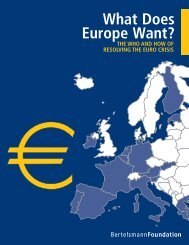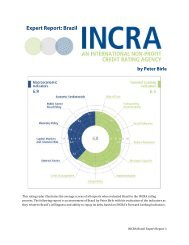CASE STUDY: THE NATURE OF GERMAN LEADERSHIPUNDER ITS EU PRESIDENCY IN SPRING 2007Policy preferences of European states traditionally tend to toggle between their Atlanticist identity and European identity. Thishas been the case for states such as the UK, Poland, and the Czech Republic and, to a lesser extent, France and Italy. In contrast,Germany tends to manifest its Atlanticist and European identity simultaneously. Germany oscillates between an outward-looking,values-driven foreign policy rooted in simultaneous expressions of Atlanticism and pro-Europeanism and a more inward-looking,insular policy more narrowly defined by self-interests. The former has been seen at several inflection points in German postwarhistory, including 1955-58 (German NATO accession and the establishment of the Treaty of Rome), 1985-86 (Plaza Accords andSingle European Act) and 1989-92 (German reunification in NATO and the Treaty of Maastricht).The 2007 German EU presidency is the latest example and could provide some predictive power for the near future. Fresh off itswildly successful hosting of the 2006 World Cup, Germany hit its zenith in the spring of 2007 when the country’s European andAtlanticist strategies coalesced in a diplomatic campaign that employed all the country’s natural political strengths: 1) its zestfor technocratic management, 2) its penchant for consensus-building, and 3) use of economic institutions imbued with deepgeopolitical meaning.Germany assumed the rotating presidency of the European Union in the first half of 2007 at a time with the union had been set adriftby its failure to pass the EU Constitution Treaty. After years of introspective and painstaking negotiation, the arduous ratificationprocess went down in defeat when voters in two of the EU’s core members, France and the Netherlands, rejected the constitutionin referenda. It was Germany under Angela Merkel’s leadership that salvaged the rudderless European project, repackaging the EUConstitution into a leaner, more technical document that became the Treaty of Lisbon, signed under the subsequent Portuguesepresidency. The political investment of the Merkel government single-handedly revived the EU to the extent that at least oneobserver deemed the most lasting legacy of her first term in leadership. 17During this period, the Merkel government engaged a campaign to rebuild relations with the US after the estrangement betweenthe two countries—and the US and Europe more broadly—in the run-up to the Iraq war. The capstone of the normalization wasthe May 2007 US-EU Summit in Washington, which launched the Transatlantic Economic Council (TEC) a cross-ministerial bodyseen at the time as a means of upgrading relations between the US and the European Union to the highest level of economiccooperation. Along with the Open Skies Agreement, the TEC was designed as a somewhat technocrat body, but it was intended asa deeply symbolic political reconciliation of the US and Europe in the wake of the intense strain of the previous four years.This is not to say that Germany’s simultaneous assumption of Atlanticist and European identities always leads to durableoutcomes. After all, Merkel’s subsequent December 2009 decision to limit the imbued powers and institutions granted underLisbon Treaty, which many expected to lead to a more centralized EU role in European political and foreign-policy decisionmaking,demonstrated that she is capable of U-turns, even on signature achievements. Nevertheless, its 2007 tandem campaignstoward Europe and the US could provide insight into how German leadership might be best deployed in the current environment.Given past reticence to take swift action, Germanleaders are likely to postpone major decision-makingor destabilizing events until after September 2013national elections.much-needed political cover in Germany,despite the Bundesbank’s protests.Maintaining the primacy of democraticinstitutions has been a central implicitmessage of the ECB, even as electedpolicymakers, recognizing its abilityto take decisive action and be lesssusceptible to public opinion, intendto cede responsibility to it over bankingsupervision and potentially a rolein recapitalization, wind-downs anddeposit protection. As the US’s 2008experience with TARP and the FederalDeposit Insurance Corporation (FDIC)demonstrates, decisions around the fateof the financial sector could open up theECB to greater political scrutiny.France is a key swing state in the eurozonesystem and will face important politicaltests in 2013. Balancing between fiscaltightening and growth promotion hascreated a precarious position for thegovernment under President FrançoisHollande, which won election on a policyplatform of increased social protection,high-income-earner tax increases (to75 percent for the top marginal rate),wage increases and qualified reversalsof changes in the retirement age, andan (unrealized) promise to renegotiatethe Fiscal Compact. The French haveguaranteed cuts in 2013 to reduce2 2The Eurozone Crisis
the deficit from 4.5 percent to threepercent. Finalizing the national budgetwill be an important test for the Frenchgovernment.Moreover, France has traditionallydemonstrated a low tolerance forstructural reform as previous governmentattempts to address eroding global and,most recently, regional competitivenesshave faltered. It recently adopted a€20 billion tax-credit scheme aimed atoffsetting labor costs. Most elementsof the Gallois report, a French answerto Germany’s Hartz labor reforms, havelargely been put on ice. As the eurozonesouth engages in protracted reforms ofthe labor market and retirement benefits,France could increasingly find its relativecompetitiveness squeezed not only byGermany, but also by countries such asItaly and Spain.Regarding future eurozone integration,Paris has implicit red lines that havenot yet been challenged. As pioneersof the “Europe of states”, the Frenchpolitical classes will be one of theleast comfortable with the notion ofgreater pooled sovereignty beyond fiscalcoordination. The emphasis on solidaritybefore sovereignty has been a consistentpolicy position over the Sarkozy- andHollande-era governments.The UK, always an ambiguous EUmember, has charted an unsustainablecourse characterized by threats of vetousageaimed at a domestic audience.This threatens the future of Britishmembership in the eurozone, which maybe put up for a highly volatile referendumin 2015 following national elections.Indirectly, the interaction between theUK’s place in Europe will inform thesecession referendum in Scotland.This has potentially far-reaching andunresolved questions regarding thefuture of successor states’ membershipin international organizations, not tomention the future of Trident submarinesat the Clyde Naval Base in Scotland.Uncertainty around the UK’s future placein the EU contributed to the decision toscuttle the BAE-EADS merger.Early in the crisis, the British were aproponent of eurozone integration,including cross-border transfers. BritishChancellor George Osborne has longattributed the UK’s weak economicperformance to a confluence of factors,including eurozone areas governancecreditability and the need for crossborderdemand adjustments. Butconstraints in the Conservative Partycombined with a souring of Britishpublic opinion have led to tougher lineson spending in Europe and clashes overregulatory competence. Both issuesculminated in the high-profile threat ofa British veto of the Fiscal Compact atthe December 2011 EU summit (whichled to the Compact’s intergovernmentalpassage outside of EU law). The Germangovernment has been instrumental inattempting to bridge this divide andkeep the UK engaged in Europe, sidingwith it—over traditional continentalpartners including France—on thesize and structure of the MultiannualFinancial Framework....the US TreasuryDepartment has shownitself to be an effective,if not alwaysappreciated, brokeramong major stakeholders,including the ECB.Recommendations for 2013US engagement in resolving the debtcrisis is controversial and requiresgreat sensitivity. The first Obamaadministration’s strategy was one ofintermittent, informal engagement in EUaffairs. This proved effective in certainacute moments including consultationswith the Spanish government in May2010, 19 extended consultations at theCamp David G8 summit after the Frenchand Greek elections, and Obama’s publicstatement of support for a banking unionon the sidelines of the G20 summitin Los Cabos, Mexico, in June 2012.Moreover, the US Treasury Departmenthas shown itself to be an effective,if not always appreciated, brokeramong major stakeholders, includingthe ECB. The Fed’s liquidity swapfacility has also played an importantrole. These currency agreementshave helped guarantee liquidity ineurozone central banks and have easedforeign-exchange fluctuations of eurodenominatedassets.The US must continue to approachthe crisis with recognition that theEU comprises the world’s largestconcentration of advanced industrialdemocracies. That said, Washington cancontribute as a partner and a power tothe eurozone’s success.1. Recognize the effects of the USbudget battles on the it’s normativeleverage in the eurozone crisis:While the US’s own debt standoff is notnecessarily seen through the lens ofWashington’s credibility as a partner,a protracted fiscal impasse will haveunintended consequences beyond USborders. Slowly, global confidence inUS fiscal policymaking has been erodedas events unfolded: the short-termnegotiations in spring 2011, the debtceilingbrinksmanship the followingsummer, the inaction of the debtsupercommittee, and the destabilizingmeasures cumulatively known as thefiscal cliff (sequestration, a two-percentincrease in the federal payroll tax,and the expiration of the Bush-era taxcuts, the alternative minimum tax andautomatic stabilizers). Gridlock couldcontinue throughout 2013. The needto again extend the debt ceiling andthe use of continuing resolutions as amechanism for funding the governmentwill add to the conundrum.The US’s tenuous fiscal positionundermines its ability to act as a brokerin the eurozone crisis. The G20 financeministers’ meeting in Mexico Cityhighlighted the concern of potentialknock-on effects of sustained fiscalbrinksmanship in Congress, particularlyon the German finance ministry. Adecisive resolution in early 2013 wouldstrengthen the US’s credibility witheurozone leaders.The Eurozone Crisis2 3
- Page 3: Field Manual to EuropeIntroduction
- Page 6: multilateral channels. Europeanshav
- Page 9 and 10: JuneBritish presidency of UNSCJune
- Page 12 and 13: US-EU Investment vs. Global Nationa
- Page 14 and 15: economic conditions in the eurozone
- Page 17 and 18: MEMO ONTHE EUROZONE CRISISThe State
- Page 19 and 20: attitude toward moral hazard. Withw
- Page 21: Greece: 2010 Bailout BreakdownGreec
- Page 27 and 28: NATO thus faces an uncertain future
- Page 29 and 30: 1. Consider NATO’s defensespendin
- Page 31 and 32: of-area operations and worldwidepar
- Page 33 and 34: concurrent terrorist attack in Beng
- Page 35: 2. Strengthen regionalpartnerships
- Page 38 and 39: MEMO ONCOUNTERTERRORISM ANDHOMELAND
- Page 40 and 41: home affairs (JHA), particularly in
- Page 43 and 44: Status of EU Countries in the US Vi
- Page 45 and 46: offensive capability centered at NA
- Page 47 and 48: socialized, i.e. there is a tacit e
- Page 49 and 50: such technology, such as deep packe
- Page 51 and 52: MEMO ONENERGY & CLIMATE CHANGEThe S
- Page 54 and 55: identifying the agents most qualifi
- Page 56 and 57: MEMO ONTURKEYThe State of PlayTurke
- Page 58 and 59: as a rising regional and internatio
- Page 60 and 61: CASE STUDY: TURKEY’S ENERGY ROLE:
- Page 62 and 63: 22%12%Turkey’s Main Trading Partn
- Page 64 and 65: MEMO ONRUSSIAThe State of PlayIn Pr
- Page 66 and 67: EU-Russia security apparatus. Themo
- Page 68 and 69: greater market access for US busine
- Page 70 and 71: MEMO ONCHINAThe State of PlayIn 201
- Page 72 and 73:
But China’s competitive meridian
- Page 74 and 75:
in millions of USDUS-China Bilatera
- Page 76 and 77:
7 6Acknowledgements
- Page 78 and 79:
CITATIONSINTRODUCTION1See “Confid
- Page 80 and 81:
20Castle, S. (17 September, 2011).
- Page 82 and 83:
ARAB UPRISING1Koch, C. (summer 2011
- Page 84 and 85:
COUNTERTERRORISM & HOMELAND SECURIT
- Page 86 and 87:
21Healey, J. (January 2012). Beyond
- Page 88 and 89:
20Berlemont, I. (25 July, 2012). Fr
- Page 90 and 91:
24Putin, V. (6 September, 2012). An
- Page 92:
Bertelsmann Foundation1101 New York






